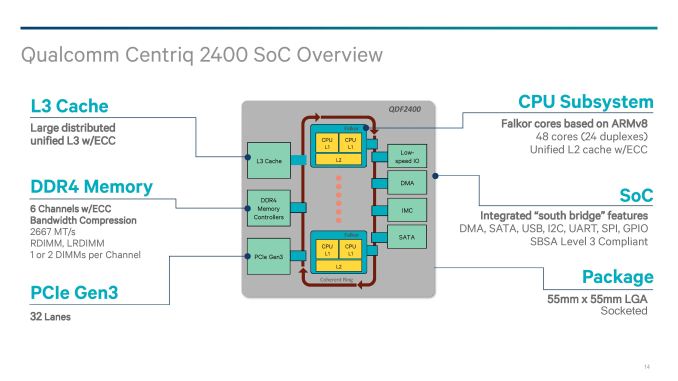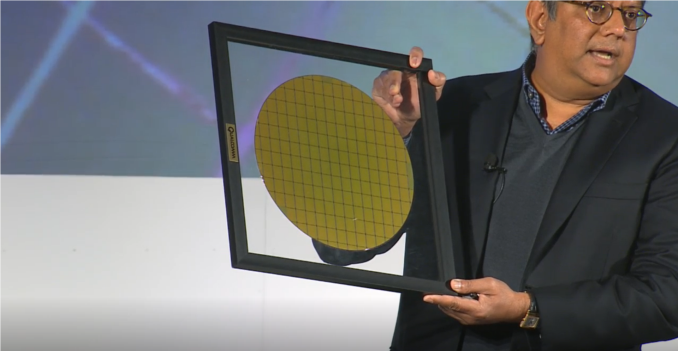Qualcomm’s Server Lead, Anand Chandrasekher, Leaves Company
by Ian Cutress on May 14, 2018 1:50 PM EST- Posted in
- CPUs
- Arm
- Qualcomm
- Enterprise
- Servers
- Centriq
- Centriq 2400

Today Axios is reporting that Anand Chandrasekher, the leading executive in charge of Qualcomm’s server efforts, has left the company. Qualcomm has declined to comment on the departure at this time.
In 2017, Qualcomm announced the Centriq 2400 family of processors, built on Arm architecture cores, for the enterprise and server market. This was meant to be the big break for Arm cores in the server market by a massive player that has the engineering staff and infrastructure to build a sizable customer base. The biggest version of the design implemented 48 of Qualcomm’s Falkor Arm v8 cores, paired with 60 MB of L3 cache, six channels of DDR4, running at a 2.2 GHz base frequency for 120W TDP and a price just shy of $2000: it was set to compete aggressively in the cloud server markets in performance per watt, overall performance, and cost. To date, Cloudflare has made the biggest noise about transitioning its DDoS protection platform from x86 to Centriq.
However, in recent weeks, noise has been made that Qualcomm is attempting to sell its server chip division. Last week Bloomberg reported that Qualcomm was to abandon its push into the datacenter, and that it was looking to either shut or sell the business as it was not making money. This runs in line with a company earnings report last month where CEO Steve Mollenkopf told analysts that ‘Qualcomm is focused on spending reductions in its non-core product areas’. At this time, the server market is not a core area for Qualcomm, even if they have just spent 3-5 years designing Centriq.
Behind the Centriq push was Anand Chandrasekher, who has been leading the unit. He joined Qualcomm from Intel to lead its marketing in mid-2012 , and then switched over to the server role in late 2013 as the President of Qualcomm Datacenter Technologies. However today Axios is reporting that Anand has left the company. News about his destination is unknown, as is the fate of Qualcomm’s server unit and Centriq processors.
Edit: Anand posted this to his Twitter, confirming his departure:
Last day at Qualcomm. In 6 years, we accomplished some great things - proved ARM could deliver better performance/watt than Intel. I leave with some great memories.
— Anand Chandrasekher (@achandrasekher) May 11, 2018












23 Comments
View All Comments
BillBear - Monday, May 14, 2018 - link
This seems a bit short sighted on Qualcomm's part. With their CDMA patent licensing it it's sunset years, they need a higher margin part going forward.rahvin - Monday, May 14, 2018 - link
An activist investor that is forcing Qualcomm to sacrifice long term planning for short term stock gain. When they get involved companies do stuff like Qualcomm is doing, abandon long term efforts for short term gain.Yojimbo - Tuesday, May 15, 2018 - link
Unlike other technology stocks, Qualcomm has about the same share price as it had before the 2008 stock market crash. Intel is more than double, Microsoft is up 3 times. Texas Instruments is up 3 times. Even Cisco is up 50%. And forget about stocks like Apple, Amazon, or NVIDIA. So where's this long term gain you are talking about? For how long are investors supposed to be patient before they demand changes?Yojimbo - Tuesday, May 15, 2018 - link
To be clear, data center is far outside Qualcomm's core competency. They are trying to break into a market that doesn't really exist that has little synergy with the rest of their business. The only reason one would say they have an advantage there over others is their size and cash reserves. In actuality, Marvell probably has the advantage. Calls for fiscal responsibility in strategic initiatives are, over the long term, what stops companies from being massively inefficient sinks. It doesn't have to be a situation of the company going under, just a matter of return on capital. The activist investors you are talking about own a significant part of the company. They are expecting a return on that significant investment, else they would be invested in something else. If they see a way for value to be created they might try to initiate it rather than pull out and invest their money elsewhere.rahvin - Tuesday, May 15, 2018 - link
Their entire business is dependent on smartphone sales. Even a single client (of about 6 total) abandoning their CPU's could cost them 30% of their business. Spending a bit of their revenue to expand beyond a constrained and not growing market segment should be the priority.Consider for a moment if they could take even 5% of the server market they'd probably quadruple their revenue. Instead the activist investor has forced them to sacrifice long term planning and focus exclusively on short term profits. When the inevitable crash comes to the smartphone market (either in the form of a new competitor or other), Qualcomm will be crushed because their entire company is based on a single market. Anyone investing long term shouldn't have this stock at all because of this shift.
Yojimbo - Thursday, May 17, 2018 - link
"Their entire business is dependent on smartphone sales."What do you mean by that?
"Consider for a moment if they could take even 5% of the server market they'd probably quadruple their revenue."
I think you underestimate the size of Qualcomm or overestimate the size of server revenue. Qualcomm had revenues of $22.3 billion last year. Server revenue was less than $80 billion, I believe. Note, this was all server revenue, not just server processors, and it includes IBM's mainframe business. Intel's data center revenue was less than $20 B in 2017, and that includes server revenue they get from chipsets, motherboards, and Omnipath (networking) sales. They have 95% of the market. If Qualcomm captured 5% of that, an ambitious goal, they'd get $1 B in revenue, which would boost their revenue by less than a paltry 5%. A big difference from quadrupling it.
You also can't expect Qualcomm to operate with the fat margins that Intel gets from its data center business. The market conditions for the two companies would be very different because of the difference in scale, the entrenched platform Intel has, and probably the greater synergy between the design of Intel's desktop processors and their server processors compared to the design of Qualcomm's server SOCs and their smartphone SOCs. Note that Qualcomm has been using ARM cores in their smartphones.
You are right that the server market is a place of good growth, but that doesn't mean that Qualcomm is the best company to go after it. As far as the smartphone market, one can expect growth to slow, possibly even stagnate, but what do you foresee that will cause a "crash"? 5G will only increase the utility of smart phones. And Qualcomm is more than just smart phones. They have a strong 5G patent portfolio. They will make money from 5G through more than just smart phones, such as internet of things and automotive.
I don't think Qualcomm is currently a good investment. Their licensing deals are likely to change, negatively affecting their revenue. But I don't think that trying to fight Intel in server CPUs is the wisest use of their capital. It would make the investment even worse. They just aren't the right company for it.
Yojimbo - Thursday, May 17, 2018 - link
"Their entire business is dependent on smartphone sales."What do you mean by that?
----
Edit: Ignore that part. I misread what you wrote. I read it as the entire server market is dependent on smartphone sales. Qualcomm is heavily dependent on smartphone sales. They should diversify, yes. Some diversification will happen organically with 5G, as mobile technologies will become important for more than just smart phones. But they should choose wisely where they diversify.
The_Assimilator - Monday, May 14, 2018 - link
Still waiting for those super awesome ARM server CPUs that are going to totally eat x86's lunch and completely disrupt the market in months.Have a feeling I'm still gonna be waiting a while.
BillBear - Monday, May 14, 2018 - link
If you read Cloudflare's report testing engineering samples of this hardware, as linked to in TFA, you'll see that it acquits itself quite well on the performance per watt and bang for the buck metrics.Dayman1225 - Monday, May 14, 2018 - link
The same CloudFlare that is monetarily affiliated with Qualcomm and the only one allowed to post results of the Qualcomm chips? Hmm. Not suspect at all :P